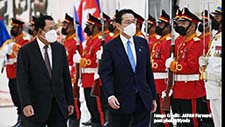North Korea’s Third Hereditary Succession: Determining Factors and Hidden Meanings
Seung Yeol Lee
North Korea appointed Kim Jong Un, the youngest son of Kim Jong Il, to the position of vice-chairman of the Central Military Commission of the Workers’ Party of Korea (WPK) at the third Party Convention on September 28, 2010. The main characteristic of North Korea’s method of succession can be explained as, “the unitary leadership of the successor will be completed as long as the suryong is living.”This is unique and differs from how other socialist countries historically have selected their new leaders. The determining factors differences and hidden meanings will play a pivotal role in the success or failure of Kim Jong Un. As a result, in the course of the power shift, the possibility of political change in North Korea will continue to increase.
Related Publications
-
Kishida in Cambodia: Seeking Regional Consensus Amid the China Threat?
Last of a two part series on Prime Minister Fumio Kishida’s travel to India and Cambodia in March 2022. This article is part of the [Asia’s Next Page] series on JAPAN […]
-
North Korean Nationalism: Reading the Paleolithic Text
North Korea, after over seven decades since establishment, continues to be poorly understood. The paucity of knowledge regarding the country is not only a matter of the lack of access […]

